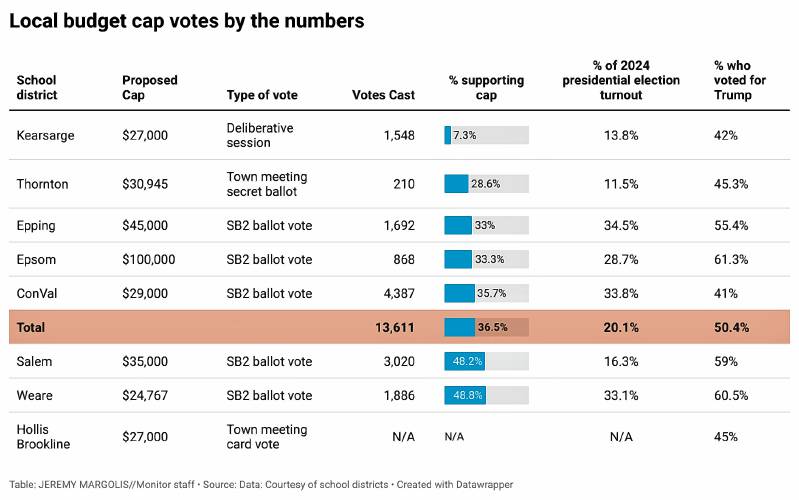Data: Local school spending caps proved universally unpopular. Why are Republican lawmakers supporting a statewide cap?

JEREMY MARGOLIS—Monitor staff
| Published: 03-23-2025 8:37 PM |
Earlier this year, after voters in the Kearsarge Regional School District soundly rejected a proposed budget cap on their schools, House Majority Leader Jason Osborne had a warning.
“Perhaps, if they are unwilling to cap themselves, the state will step in and cap local taxes for them,” he threatened.
Last week, two days after voters in five more school districts rejected their local caps, Osborne led Republican representatives in making good on that promise by passing a statewide budget cap bill.
In a legislative cycle in which the Democratic minority has little power, the bill has sparked particular outrage within the party because it appears to them to fly in the face of New Hampshire’s emphasis on local control.
“For the state to come in and suggest that it knows everything and shall impose a state-determined budget cap, I think is an insult to voters across the state who have said their piece loud and clear on this issue,” Democratic Rep. Dave Luneau of Hopkinton said this week.
Rep. Hope Damon, a Democrat from Croydon, described the bill, HB 675, as “an arbitrary sledgehammer that attacks local control without any flexibility, reason, or fairness.”
The proposed law sets out a formula that would tie school budget maximums to inflation and enrollment.
District voters would need a two-thirds majority to override their cap.
Article continues after...
Yesterday's Most Read Articles
In a reversal of roles, Republicans, normally the party to defend local control, have instead argued that the district-level budget caps votes do not represent statewide sentiment because turnout is so low.
“When 7.5% of my neighbors all get together and decide to take my house, that is not local control,” said Osborne, one of the bill’s sponsors. “That is tyranny of fringe special interests.”
If the bill becomes law, it would reshape how education spending in the state works, stripping districts of significant control over the budgets they bring before voters.
Republican Rep. Ken Weyler of Kingston has called the bill “one of the most important pieces of legislation we can pass this year.”
The Monitor examined what vote totals in the eight districts that rejected local caps – Kearsarge, Epsom, Contoocook Valley, Epping, Salem, Thornton and Weare – can and can’t tell us about sentiment surrounding the issue.
In the five districts that voted on local caps by ballot, turnout ranged from 16% to 34% of participation rates in last fall’s presidential election.
In the two districts in which votes occurred at a deliberative session or town meeting, turnout was 14% and 11%, respectively.
One school district – Hollis-Brookline – voted by cards to pass over the warrant article entirely.
In all, 13,611 people weighed in on local caps, which was 20% of the number who voted for president.
Overall, the caps – which ranged in amount from $24,767 in Weare to a symbolic $100,000 in Epsom – were supported by only 36% of voters.
In Weare, the cap garnered support from 49% of voters, the highest mark, but it did not come close to the 60% threshold required to pass.
The cap received the least support in Kearsarge, where just 7% of people voted for it.
School districts in both Republican and Democratic-leaning communities rejected local budget caps, but some correlation seemed evident between a district’s party politics and vote margin.
Two of the three districts that voted for President Trump at the highest rate in 2024 – Weare at 60% and Salem at 59% – also supported their respective budget caps the most.
Kearsarge, the district that rejected its budget cap with the largest margin – 93% to 7% – was one of the more Democratic-leaning.
Epsom, however, proved an outlier. It was the most Trump-supporting district but had the third-lowest rate of support for its budget cap, despite the fact that it was altered to a symbolic $100,000 per pupil.
Republican Rep. Carol McGuire of Epsom, a sponsor of the local budget cap bill, said that most of the people who attended a February deliberative session in her town “were not the ones who usually go to town deliberative session or who I see at town events.”
Despite the widespread opposition demonstrated by the vote, she is supportive of a statewide budget cap.
“I have heard from so many people in Epsom and in my other towns that the property taxes are killing them and the school budget is the biggest part of the property taxes,” she said in an interview. “And a lot of those people are the people who didn’t go to the school deliberative session for one reason or another.”
Jeremy Margolis can be contacted at jmargolis@cmonitor.com.







 Henniker ponders what is a ‘need’ and what is a ‘want’
Henniker ponders what is a ‘need’ and what is a ‘want’ Boscawen residents vote to fund major renovation of public works building
Boscawen residents vote to fund major renovation of public works building ‘Voting our wallets’: Loudon residents vote overwhelmingly against $1.7M bond for new fire truck
‘Voting our wallets’: Loudon residents vote overwhelmingly against $1.7M bond for new fire truck In Pembroke, Education Freedom Accounts draw debate, voters pass budget
In Pembroke, Education Freedom Accounts draw debate, voters pass budget
